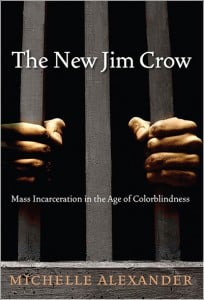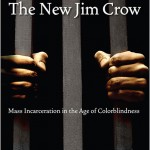As I wrote four weeks ago, I’m running a book group through my church, Valley and Mountain, to read The New Jim Crow: Mass Incarceration in the Age of Colorblindness by Michelle Alexander. (Find all the posts for this book group here. Feel free to use this guide in your church/community!)
Chapter five is a summary of the arguments Alexander has made about how mass incarceration operates as the new system of social control of black men in America. She draws important parallels between mass incarceration and the old system of Jim Crow laws and points out important differences between the two–for example, she argues that under Jim Crow laws, black communities were able to support each other, but the stigma of incarceration serves to divide families and neighbors.
How the meetings run:
A quick recap:
Each meeting, we’ll start with a welcome. Then, we’ll have a brief moment of silence. Next, we’ll take turns reading a short text (a Bible verse, poem, quote, or short reading) that somehow reflects our spirituality. Then I’ll read a relevant Bible passage or spiritual reading (for example, by a thinker like Cornel West) and share a short reflection on the text. We’ll discuss the discussion questions for the week, which I’ve pulled from various sources online. To close, we’ll have a prayer circle.
Week 5:
Intro
Our usual moment of silence, followed by sharing our spiritual texts.
Reflection
Next, we’ll read a short spiritual text. I chose the two for this week. First, a short quote from Sojourner Truth, black abolitionist, which I found characterized as a “reframing” of slavery on this site:
Sojourner Truth: “O friends, pity the poor slaveholder, and pray for him. It troubles me more than anything else, what will become of the poor slaveholder, in all his guilt and all his impenitence. God will take care of the poor trampled slave, but where will the slaveholder be when eternity begins?”
Next, a longer quote from Martin Luther King, Jr., about the white moderate. Alexander mentions this particular passage, which comes from King’s “Letter from a Birmingham Jail“–which, besides being an important and beautiful essay, is an excellent example of how to argue effectively:
I must make two honest confessions to you, my Christian and Jewish brothers. First, I must confess that over the past few years I have been gravely disappointed with the white moderate. I have almost reached the regrettable conclusion that the Negro’s great stumbling block in his stride toward freedom is not the White Citizen’s Counciler or the Ku Klux Klanner, but the white moderate, who is more devoted to “order” than to justice; who prefers a negative peace which is the absence of tension to a positive peace which is the presence of justice; who constantly says: “I agree with you in the goal you seek, but I cannot agree with your methods of direct action”; who paternalistically believes he can set the timetable for another man’s freedom; who lives by a mythical concept of time and who constantly advises the Negro to wait for a “more convenient season.” Shallow understanding from people of good will is more frustrating than absolute misunderstanding from people of ill will. Lukewarm acceptance is much more bewildering than outright rejection.
I had hoped that the white moderate would understand that law and order exist for the purpose of establishing justice and that when they fail in this purpose they become the dangerously structured dams that block the flow of social progress. I had hoped that the white moderate would understand that the present tension in the South is a necessary phase of the transition from an obnoxious negative peace, in which the Negro passively accepted his unjust plight, to a substantive and positive peace, in which all men will respect the dignity and worth of human personality. Actually, we who engage in nonviolent direct action are not the creators of tension. We merely bring to the surface the hidden tension that is already alive. We bring it out in the open, where it can be seen and dealt with. Like a boil that can never be cured so long as it is covered up but must be opened with all its ugliness to the natural medicines of air and light, injustice must be exposed, with all the tension its exposure creates, to the light of human conscience and the air of national opinion before it can be cured.
Discussion Questions
I am using the questions from The New Jim Crow Study Guide, which you can download for free here. In addition, I asked: What did you find interesting or difficult about this week’s chapter?
Notes:
This chapter is a lot of summary–I think if I had it to do over, I would organize the meetings a bit differently and condense the group somewhat. Although having one meeting per chapter has been good for getting to know one another and certainly facilitated the spiritual aspects of this group, I think that the chapters lend themselves more easily to this schedule:
Week 1: Introduction & Chapter 1
Week 2: Chapter 2 & 3
Week 3: Chapter 4
Week 4: Chapter 5 & 6










